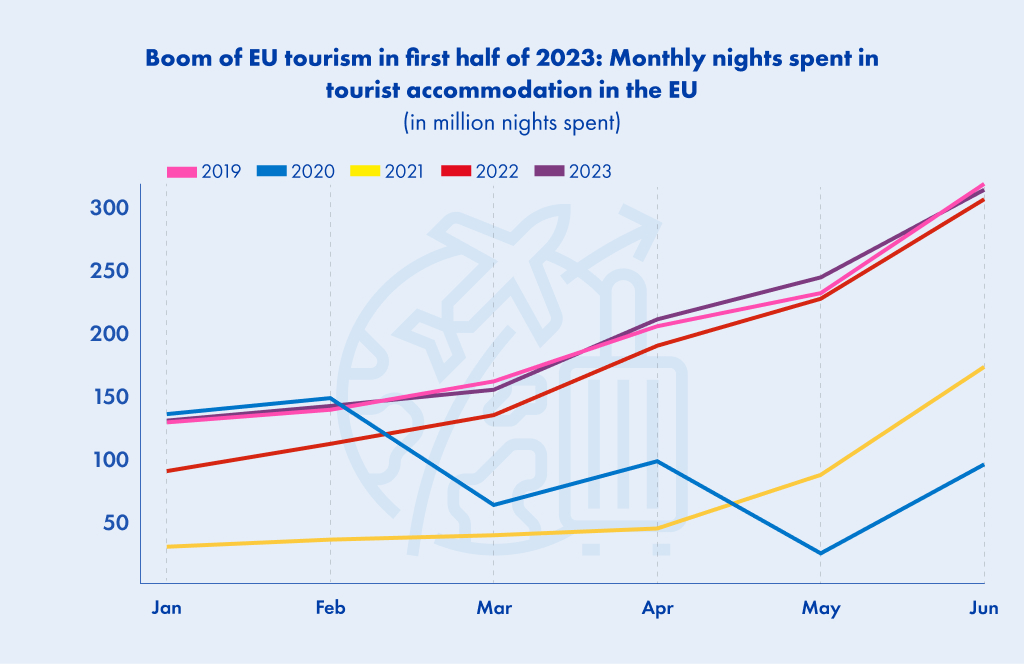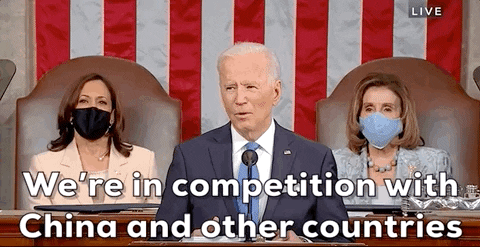Issue #139
Guten Morgen! Servus! With heavy heads and light hearts, we welcome you to this week’s Krautshell edition, where you will almost visualize a Bretzel while going through the lines and definitely get thirsty when you are done with it. Our main articles look into a remake of a situation inspired by Watergate, where Nancy Faeser tackled Arne Schönbohm’s case, how the OG’z in Germany looked again into the modern technology of digitization, and why Chancellor Olaf Scholz’s speech in New York sounded like UNGA bunga to the world. We also have some snippets about the overview of EU tourism in 2023. And Lastly, Ansgar touches upon how the ‘tech cold war’ between the U.S. and China might not be the best way forward to develop clean tech globally. O’zapft is! Anna Szilvia WHAT TO WATCH THIS WEEK: A German Safety Concern or Just Stupid Watergate? After weeks of keeping quiet on the matter, Nancy Faeser, Germany’s Interior Minister and member of the SPD waltzed into the Bundestag’s Interior Committee to tackle the Schönbohm case. So, what’s the fuss about? Well, Faeser decided in October 2022 to kick Arne Schönbohm out of his role as head of the Federal Office for Information Security (BSI). Why? Because a source as credible as the professional “satirist” Jan Böhmermann accused Schönbohm of having close ties with the “Cybersecurity Council of Germany”, supposedly in cahoots with the Russian intelligence agency FSB. To make matters more dramatic, Faeser’s gunning for the position of Minister-President of Hesse in the upcoming election in 2 weeks, and the SPD-Hessen is polling about as well as a rubber duck in a shark tank. Critics have had to wait for weeks until the Interior Minister graced the Interior Committee with her presence to defend her actions. But the pièce de résistance was the opposition’s accusation that Faeser really was just trying to remove civil servants appointed by the previous government from prestigious positions. She allegedly asked the Federal Office for the Protection of the Constitution (BfV) chief Thomas Haldenwang to dig up dirt on Schönbohm in 2023, even though the Interior Ministry had previously given him a clean bill of health. Haldenwang did his best and declared that Faeser hadn’t whispered a word to the BfV since October 2022. The Union eventually abandoned the Watergate Junior storyline, instead accusing Faeser of political grandstanding in the face of her abysmal polling numbers in Hesse, which are comparable to George McGovern, rather than Nixon, if we’re honest… INSIGHTS FROM PARLIAMENT: The German Online Access Act: A Bottomless Pit Back in the old days of 2017, the German Online Access Act (Onlinezugangsgesetz, OZG) was adopted to provide support for digitalization and make state administrative services electronically accessible. Giving the generous deadline by the end of 2022 and then trying to make up for failures, now comes Round 2! In light of the fact that Germany ranks no. 18 for digitization of public administration in the EU comparison in 2023, the traffic light coalition announced the OZG 2.0 that shall finally make a digital user-friendly administration real. Skepticism regarding the process – now without a hard deadline – is growing, as on top of this, the responsible Federal Ministry of the Interior slashed the budget planned for 2024. Instead of 377 million euros in 2022, the Federal Ministry of the Interior wants to invest only 3 million in digitization next year. That´s peanuts! Now, the remaining funds from the previous year are to be used to make up for the difference. While everyone agrees that administrative digitization must be accelerated, no one seems to be on the same page on how to do this. The main takeaway from the first debate at the Bundestag was a clear focus on Bavaria-bashing across the coalition parties. Difficult tactic when the draft requires approval from the Bundesrat and thus the Länder. But there is still a long way to get there and first, there will be some more discussions on the topic. THE BIG PICTURE: All Eyes of the World on Us? It is that time of the year again! The most important stakeholders gather at this unique place to share their views and highlight their continuous commitment in their speeches, while the world is watching in excitement to pay tribute to the important things in life: Wurst & Bier! Yes, it´s once again Oktoberfest time! Oh, sorry, you thought I was gonna talk about the UNGA 78 in New York?! Well… as you wish…but it was definitely less exciting than Munich. The grand German delegation, consisting of eleven government officials, set off for the UN General Assembly in New York with high hopes, but it turned out to be a political dud. The SPD and Green Party politicians were aiming to champion their ideas on sustainability and climate protection, leaving the FDP representatives behind. The problem? The world just wasn’t interested. On Tuesday, Chancellor Olaf Scholz experienced the weight (or lack thereof) of his words on the global stage. He delivered his speech to nearly empty seats, a stark indication that the rest of the world wasn’t particularly keen on hearing how Germany planned to combat global climate change. The chilly reception continued, when at a press conference to discuss German environmental policies, a mere seven journalists showed up. To make matters worse, all of them were German reporters – who had flown from Berlin to New York with the politicians. It was like a reunion of old acquaintances who could have just as easily met around a living room table, rather than needing a 12762-mile round trip to do so. Yet, the rest of the world remained uninterested, which was also reflected in the fact that US President Joe Biden was the only leader of the permanent five members of the UN Security Council to attend. Alles Wurscht! We should have stayed with the Oktoberfest topic! Source: ec.europa.eu Here are three appointments for next week that you should have on your radar: THE BIGGEST LOSER Simple question: How likely is it that you get an invitation to a house party if you punched the host in the mouth the day before? Street wisdom suggests chances are rather low. Politicians in DC are trying to convince themselves otherwise. A year ago, on October 7th 2022, the Biden administration released a set of export controls on semiconductors against China. Until now, these controls were by far the most complex and far-reaching, trying to stymie China’s progress in emerging technologies like AI or quantum computing. The October 7th controls are a direct outcome of a new paradigm vis-à-vis China. National Security Advisor Jake Sullivan announced that the US “… must maintain a large of a lead as possible” rather than just trying to stay ahead. This is radical stuff. Question number 1 is of course: Do the controls work? Not that well. China is doubling down on native semiconductor capabilities and gets there quickly, as the Huawei Mate 60 Pro release showed. Maybe the even bigger question is: Can the US and China cooperate on fighting climate change while waging a “tech cold war” at the same time? There is a real danger that cleantech will be drawn into the fight. Chinese export controls on solar panels are now a real threat. Republicans in DC already argue that energy transition should be paused because it could lead to dependencies on Chinese tech. The truth is: The timing for great power competition fought out in the tech space is really bad. We need globally available cleantech asap. It is unclear who might win the “Tech Cold War” – but it seems to be clear that the planet will be losing. Issue #139


FIRST, AN OUTLOOK FROM SZILVIA:
NOW, SOME SOLID INTEL:
TAKE A BREAK, GIVE YOUR EYES A REST.

LONG STORY SHORT:
OUTLOOK:
When?
What?
September 25th, 2023
State Visit of the President of the Republic of Latvia, Edgars Rinkēvičs to Germany
September 26th – 29th, 2023
46th German Conference on Artificial Intelligence in Berlin
September 26th, 2023
Federal Ministry for Digital Affairs and Transport - Annual Conference Innovative Network Technologies
WHAT’S ON OUR MINDS:




